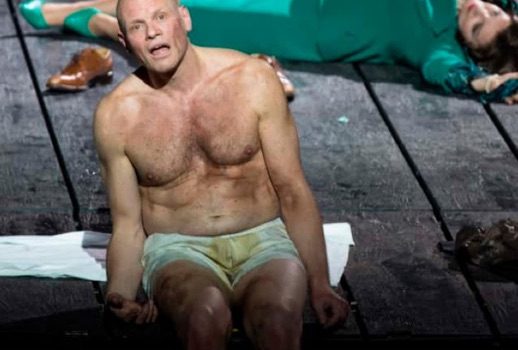
A quick glace around the Internet revealed some 49 operas inspired by Shakespeare, from Henry Purcell’s The Fairy-Queen to Thomas Adés’ The Tempest. I’m not counting West Side Story or Re Lear, for which a libretto was completed by Antonio Somma but Giuseppe Verdi unfortunately never got around to finishing the score.
Reimann’s opera, set to a libretto by Claus H. Henneberg, famously premiered at the Bayerische Staatsoper in 1978 as a vehicle for Dietrich Fischer-Dieskau. Jean-Pierre Ponnelle’s original production soon transferred to the San Francisco Opera where it was performed in English starring Thomas Stewart. Productions in Paris and London followed shortly thereafter. In addition to a Deutsche Gramophon studio recording, a 1982 telecast from Munich with many members of the original cast can be found on pirated DVDs; a broadcast from San Francisco also exists.
Post-Mozart and Billy Budd, Bo Skovhus has morphed into a champion of New Music and has sung Lear in Hamburg (the source of this week’s performance) and most recently in Paris. Reimann does like his coloraturas (the music for the heroine of his most recent opera, Medea, is a marathon written with Marlis Petersen in mind; she returns to sing it at Wiener Staatsoper this season), and newcomer Siobhan Stagg tackles Cordelia’s difficult music in a 2014 performance led by Simone Young.
Schreier, a 37-year-old composer from Aachen, Germany, was commissioned by Theater an der Wien to compose an opera for its ongoing Shakespeare celebration, which also includes Antonio Salieri’s Falstaff, Verdi’s Macbeth in both its original 1847 version and 1865 revision, The Fairy-Queen, and in concert Johann Adolph Hasse’s Piramo e Tisbe.
Schreier’s Hamlet, a critical success at its world premiere on 14 September 2016 in a production by Christof Loy, diverges from a strict, linear adaptation of the play. Thomas Jonigk uses not only Shakespeare for his libretto, but sources which Shakespeare possibly cinsulted, such as Saxo Grammaticus’ Historia Danica and François de Belleforest’s Histoires tragiques.
The opera presents a series of 24 episodes in Hamlet’s life concentrating on interpersonal relationships, such as the prince’s incestuous relationship with his mother, Gertrud.
Musically, I find it to be influenced by the Three B’s: Bartók, Berg, and Britten, with a touch of Richard Strauss for irony. In perhaps a nod to Reimann, who assigned Lear’s Fool to an actor, Schreier created the Ghost of Hamlet’s Father as a speaking role, here performed by veteran countertenor Jochen Kowalski. One of the many choices which I find fascinating in this opera is the decision for the chorus to perform the “To be or not to be” soliloquy, as if so many voices speaking inside Hamlet’s head.
Sporting ripped jeans, a T-shirt and a man bun, young baritone Andrè Schuen scored a triumph in the title role. Marlis Petersen plays his sex-crazed mum, memorably letting her son’s hair cascade from the top of his head as she strokes his face. Bo Skovhus is here, too, creating the role of Claudius. Michael Boder leads the ever-adventurous ORF Radio-Symphonieorchester Wien and the Arnold Schoenberg Chor in this broadcast of the world premiere. Hamlet was subsequently streamed online, and will be telecast by ORF in November.
Post scriptum – In case these passed you by in a busy week, I posted several performances which have been hot topics in recent weeks on Parterre: Der Rosenkavalier from the Boston Symphony with Andris Nelsons leading Renée Fleming, Susan Graham, and Franz Hawlata; a concert performance from Berlin of Act I of Die Walküre with Anja Harteros in her role debut as Sieglinde, along with Peter Seiffert and basso-of-the moment Georg Zeppenfeld; and finally Harteros’ first Tosca in Wien, in the less-than-stellar company of Jorge de León and Marco Vratogna. As always, they can be found at https://www.mixcloud.com/Jungfer_Marianne_Leizmetzerin/.
It’s been a while since I saw a truly demented Tosca and Harteros did not disappoint: lines growled rather than sung, ample dips into chest voice, an actual cackle as she rips the safe-conduct from Scarpia’s corpse, and an A+ in cape-waving (including some Julie-Andrews-as-Maria-von-Trapp 360° twirls in Act III). Her loose cannon approach made my last Tosca, Angela “they made me wait so I make them wait” Gheorghiu, seem downright schoolmarmish.


